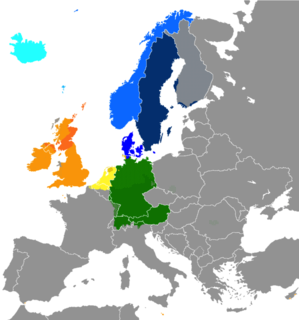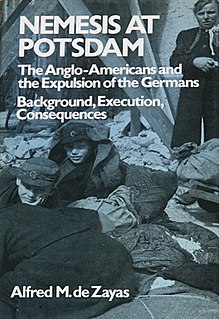
During the later stages of World War II and the post-war period, Germans and Volksdeutsche fled or were expelled from various Eastern and Central European countries, including Czechoslovakia, and the former German provinces of Silesia, Pomerania, and East Prussia, which were annexed by Poland and the Soviet Union. In 1957, Walter Schlesinger discussed reasons for these actions, which reversed the effects of German eastward colonization and expansion: he concluded, "it was a devastating result of twelve years of National Socialist Eastern Policy." The idea to expel the Germans from the annexed territories was proposed by Winston Churchill, in conjunction with the Polish and Czechoslovak exile governments in London at least since 1942. In late 1944 the Czechoslovak exile government pressed the Allies to espouse the principle of German population transfers. On the other hand, Polish prime minister Tomasz Arciszewski, in an interview for The Sunday Times on 17 December 1944, supported the annexation of Warmia-Masuria, Opole Regency, north-east parts of Lower Silesia, and parts of Pomerania, but he opposed the idea of expulsion. He wanted to naturalize the Germans as Polish citizens and to assimilate them.
A Terrible Revenge: The Ethnic Cleansing of the East European Germans, 1944–1950 is a 1994 non-fiction book written by Cuban-born American lawyer Alfred-Maurice de Zayas, former research fellow at MPG in Heidelberg, Germany. The work is based on a collection of testimonials from German civilians and the Third Reich military personnel; and devoted to the expulsion of Germans after World War II from states previously occupied by the Nazis. It includes as well selected interviews with British and American politicians who participated at the Potsdam Conference, including Robert Murphy, Geoffrey Harrison, and Denis Allen. The book attempts to describe the crimes committed against the German nation by the Soviet Union, Poland, Czechoslovakia, Hungary and Yugoslavia at the end of World War II – as perceived by the expellees themselves and settlers brought in Heim ins Reich from the east.

Low Franconian, Low Frankish, Netherlandic is a linguistic category used to classify a number of historical and contemporary West Germanic varieties closely related to, and including, the Dutch language. Most dialects and languages included within the category are spoken in the Netherlands, northern Belgium (Flanders), in the Nord department of France, in western Germany, as well as in Suriname, South Africa and Namibia.

The West Germanic languages constitute the largest of the three branches of the Germanic family of languages.

Alfred-Maurice de Zayas is an American lawyer, writer, historian, expert in the field of human rights and international law and retired high-ranking United Nations official. From 1 May 2012 to 30 April 2018 he served as the first UN Independent Expert on the Promotion of a Democratic and Equitable International Order.

Guido Knopp is a German journalist and author. He is well known in Germany, mainly because he has produced a great number of TV documentaries, predominantly about the "Third Reich" and National Socialism, but also about other topics, such as Stalinism.

The evacuation of East Prussia was the movement of German civilian population and military personnel from East Prussia between 20 January and March 1945, that was initially organized and carried out by state authorities but quickly turned into a chaotic flight from the Red Army.
The All-German Bloc/League of Expellees and Deprived of Rights was a right-wing political party in West Germany, which acted as an advocacy group of the Germans fled and expelled in and after World War II.
The registered German minority in Poland at the 2011 national census consisted of 148,000 people, of whom 64,000 declared both German and Polish ethnicities and 45,000 solely German ethnicity. At a 2002 census there were 152,900 people declaring German ethnicity. Representatives of the German ethnic minority presume that the figures for their group are somewhat higher because after their exclusion in the communist period, members of the minority prefer not to state their real ethnicity. Also, due to complications arising from multi-ethnic Polish/German identities, many people of partial German descent do not identify with their German background, and some estimates number Poles with varying degrees of German ancestry from 400,000 to 500,000.

Demographic estimates of the flight and expulsion of Germans have been derived by either the compilation of registered dead and missing persons or by a comparison of pre-war and post-war population data. Estimates of the number of displaced Germans vary in the range of 12.0–16.5 million. The death toll attributable to the flight and expulsions was estimated at 2.2 million by the West German government in 1958 using the population balance method. German records which became public in 1987 have caused some historians in Germany to put the actual total at about 500,000 based on the listing of confirmed deaths. The German Historical Museum puts the figure at 600,000 victims, they maintain the official figure of 2 million cannot be supported. However, the German Red Cross still maintains that death toll in the expulsions is 2,251,500 persons.

The flight and expulsion of Germans from Poland was the largest of a series of flights and expulsions of Germans in Europe during and after World War II. The German population fled or was expelled from all regions which are currently within the territorial boundaries of Poland, including the former eastern territories of Germany and parts of pre-war Poland.

The expulsion of Germans from Czechoslovakia after World War II was part of a series of evacuations and deportations of Germans from Central and Eastern Europe during and after World War II.

Nemesis at Potsdam: The Anglo-Americans and the Expulsion of the Germans is a 1977 book by Cuban-born American lawyer Alfred-Maurice de Zayas. Its title is drawn from Greek mythology; Nemesis is the Greek goddess of revenge. The implication is that at the Potsdam Conference the victorious Allies of World War II took revenge on the Germans, entailing significant territorial losses in Eastern Europe and the forced transfer of some 15 million Germans from their homelands in East Prussia, Pomerania, Silesia, East Brandenburg, Czechoslovakia, Hungary, and Yugoslavia.

The German evacuation from Central and Eastern Europe ahead of the Red Army advance in World War II was delayed until the last moment. Plans to evacuate people from the territories controlled by Nazi Germany in Central and Eastern Europe, including from the former eastern territories of Germany as well as occupied territories, were prepared by German authorities only when the defeat was inevitable, resulting in utter chaos. The evacuation in most of the Nazi-occupied areas began in January 1945, when the Red Army was already rapidly advancing westward.
Heinz Gottfried Nawratil is a German lawyer, legal author and human rights activist.
Franz Wilhelm Seidler is a German historian, author and expert on German military history. From 1973 to 1998, he was a professor of Modern History at the Bundeswehr University Munich. Since retirement, he has published works of revisionist nature in extreme right-wing publishers, such as Pour le Mérite Verlag.
Ingo Haar is a German historian. He received his Master of Arts from the University of Hamburg in 1993 and his PhD in History in 1998 at the Martin Luther University of Halle-Wittenberg. His doctoral dissertation was on "Historians in Nazi Germany: the German history and the`'Ethnic struggle' in the `East'".
Wolfram Euler is a German historical linguist and Indo-Europeanist.

Anton Storch was a German politician, a member of the Christian Democratic Union (CDU) and the minister of labor from 1949 to 1957.
Helmut Irblich is a German architect and building contractor in Schweinfurt. In 1989 he was awarded the Federal Cross of Merit for his diverse social engagement and in particular for his services to the promotion of commercial vocational training. He received another honor in 2011 from the Bavarian Ministry of Economic Affairs for his life's work, especially for his services to the economic development of the Schweinfurt region.







